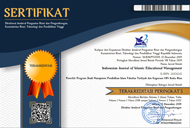Teachers' Pre-Service Programs Curriculum to Prepare Professional Teachers at Education Faculties
Abstract
The competency of teachers has a significant impact on the quality of education. The Education Faculties should prepare the teacher to be a professional teacher. The research aim is to find out the the program should pre-service program at faculties to ensure the qualified teacher in the future.The research methodology relies on a review of the relevant literature. The research findingwere the curriculum of the Teachers’ Pre-Service program should be considered are pedagogy and instructional strategies, subject matter expertise, child development and educational psychology, inclusive education, classroom management, assessment and evaluation, teaching practicum, ethics and professionalism, digital literacy and educational technology by combining theoretical knowledge and practical experiences, the teachers'' pre-service program at faculties of education prepares aspiring teachers to become certified educators.
Full Text:
PDFReferences
Asst, A. (2019). Exploring Pre-Service Teachers’ Perceptions of Their Pedagogical Preferences, Teaching Competence and Motivation. International Journal of Instruction, 12(1), 493–510. www.e-iji.net
Akayoglu, S., Satar, H. M., Dikilitas, K., Cirit, N. C., & ... (2020). Digital literacy practices of Turkish pre-service EFL teachers. Australasian Journal of …, 5(6), 87–89. https://ajet.org.au/index.php/AJET/article/view/4711
Akayoğlu, S., Satar, H. M., Dikilitaş, K., Cirit, N. C., & Korkmazgil, S. (2020). Digital literacy practices of Turkish pre-service EFL teachers. Australasian Journal of Educational Technology, 36(1), 85–97. https://doi.org/10.14742/ajet.4711
Al Sultan, A., Henson, H., & Fadde, P. J. (2018). Pre-service elementary teachers’ scientific literacy and self-efficacy in teaching science. IAFOR Journal of Education, 6(1), 25–42. https://doi.org/10.22492/ije.6.1.02
Alanko, A. (2018). Preparing pre-service teachers for home–school cooperation: Exploring Finnish teacher education programmes. Journal of Education for Teaching, 44(3), 321–332. https://doi.org/10.1080/02607476.2018.1465644
Anderson, J. O., Lin, H. S., Treagust, D. F., Ross, S. P., & Yore, L. D. (2007). Using large-scale assessment datasets for research in science and mathematics education: Programme for International Student Assessment (PISA). International Journal of Science and Mathematics Education, 5(4), 591–614. https://doi.org/10.1007/s10763-007-9090-y
Angeli, C. (2005). Transforming a teacher education method course through technology: Effects on preservice teachers’ technology competency. Computers and Education, 45(4), 383–398. https://doi.org/10.1016/j.compedu.2004.06.002
Ariana, R. (2016). Penggunaan Aplikasi Merdeka Mengajar dalam Meningkatlan Hasil Belajar Siswa pada sekolah Penggerak. Jurnal Ilmiah Pendidikan Dasar, 07(2), 1–23.
Aslan, S. (2022). An Analysis of the Primary School Teachers’ Classroom Management Styles in Terms of Some Variables. International Online Journal of Education and Teaching, 9(2), 955–970. https://eric.ed.gov/?id=EJ1342691
Awad, N., & Barak, M. (2018). Pre-service science teachers learn a science, technology, engineering and mathematics (STEM)-oriented program: The case of sound, waves and communication systems. Eurasia Journal of Mathematics, Science and Technology Education, 14(4), 1431–1451. https://doi.org/10.29333/ejmste/83680
Baxter, P., & Jack, S. (2015). Qualitative Case Study Methodology: Study Design and Implementation for Novice Researchers. The Qualitative Report, 13(4), 544–559. https://doi.org/10.46743/2160-3715/2008.1573
Bedir, H. (2019). Pre-service ELT teachers’ beliefs and perceptions on 21st century learning and innovation skills (4Cs). Journal of Language and Linguistic Studies, 15(1), 231–246. https://doi.org/10.17263/jlls.547718
Calderón, A., Scanlon, D., MacPhail, A., & Moody, B. (2021). An integrated blended learning approach for physical education teacher education programmes: teacher educators’ and pre-service teachers’ experiences. Physical Education and Sport Pedagogy, 26(6), 562–577. https://doi.org/10.1080/17408989.2020.1823961
Carter, R., & Nunan, D. (2001). The Cambridge Guide to Teaching English to Speakers of Other Languages. Cambridge University Press. http://www.cambridge.org
Cucu, C., & Mardiyati, I. (2019). Halaqah Keluarga Di Era Milenial Perspektif Psikologi Dakwah. Raheema, 6(2), 227–244. http://jurnaliainpontianak.or.id/index.php/raheema/article/view/1399
Dalinger, T., Thomas, K. B., Stansberry, S., & Xiu, Y. (2020). A mixed reality simulation offers strategic practice for pre-service teachers. Computers and Education, 144(September 2019), 103696. https://doi.org/10.1016/j.compedu.2019.103696
Dally, K., Dempsey, I., Ralston, M. M., & ... (2019). Current issues and future directions in Australian special and inclusive education. Australian Journal of Teacher Education, 44(8), 97–123. https://doi.org/10.3316/informit.737442807836706
Demirkan, O. (2019). Pre-Service Teachers’ Views about Digital Teaching Materials. Educational Policy Analysis and Strategic Research, 2(2), 21–29. https://eric.ed.gov/?id=EJ1212874
Demirkan, Ö. (2019). Pre-service Teachers’ Views about Digital Teaching Materials. Educational Policy Analysis and Strategic Research, 14(1), 40–60. https://doi.org/10.29329/epasr.2019.186.3
Eckstein, M. A. (2019). A cross-sectional survey evaluating transgender-related care education in United States pharmacy school curricula. Currents in Pharmacy Teaching and Learning, 11(8), 782–792. https://doi.org/10.1016/j.cptl.2019.04.005
Ene, C. U., Ugwuanyi, C. S., Okeke, C. I. O., Nworgu, B. G., & ... (2021). Factorial Validation of Teachers’ Self-Efficacy Scale Using Pre-Service Teachers: Implications for Teacher Education Curriculum. International Journal of …, 10(1), 113–212. https://eric.ed.gov/?id=EJ1286040
Fackler, S., Sammons, P., & Malmberg, L. E. (2021). A comparative analysis of predictors of teacher self‐efficacy in student engagement, instruction and classroom management in Nordic, Anglo‐Saxon and East and …. Review of Education, 9(1), 203–239. https://doi.org/10.1002/rev3.3242
Franklin, H., & Harrington, I. (2019). A review into effective classroom management and strategies for student engagement: Teacher and student roles in today’s classrooms. Journal of Education and Training Studies, 7(12), 1–12. https://rune.une.edu.au/web/handle/1959.11/27556
Halamish, V. (2018). Pre-service and in-service teachers’ metacognitive knowledge of learning strategies. Frontiers in Psychology, 9(2), 2152–2152. https://doi.org/10.3389/fpsyg.2018.02152
Hannemann, L., Uhde, G., & Thies, B. (2019). Evaluation of a classroom management training for future teachers. Zeitschrift Für Bildungsforschung. https://doi.org/10.1007/s35834-019-00255-1
He, Q., von Davier, M., Greiff, S., Steinhauer, E. W., & Borysewicz, P. B. (2017). Collaborative Problem Solving Measures in the Programme for International Student Assessment (PISA). Methodology of Educational Measurement and Assessment, April, 95–111. https://doi.org/10.1007/978-3-319-33261-1_7
Kamaruddin, I., Uran, S. I. G., Kurniawan, A., Ningsih, W., Fathurrohmah, T., Amir, A., & Febrianti, A. N. (2022). Manajemen Pendidikan. Get Press.
Karakolidis, A., Pitsia, V., & Emvalotis, A. (2016). Examining students’ achievement in mathematics: A multilevel analysis of the Programme for International Student Assessment (PISA) 2012 data for Greece. International Journal of Educational Research, 79, 106–115. https://doi.org/10.1016/j.ijer.2016.05.013
Karami, M., Karami, Z., & Attaran, M. (2013). Integrating problem-based learning with ICT for developing trainee teachers’ content knowledge and teaching skill. International Journal of Education and Development Using Information and Communication Technology (IJEDICT), 9(3), 36–49.
Kaya, M., & Selvitopu, A. (2019). A Meta-Analysis of the Effects of Some Factors on Teachers’ Classroom Management Skills. International Journal of Advanced Science and Technology, 29(7), 3263–3271. https://dergipark.org.tr/en/download/article-file/879985
KEMENDIKBUD. (2019). Hasil PISA Indonesia 2018: Akses Makin Meluas, Saatnya Tingkatkan Kualitas. Kemdikbud.Go.Id. https://www.kemdikbud.go.id/main/blog/2019/12/hasil-pisa-indonesia-2018-akses-makin-meluas-saatnya-tingkatkan-kualitas
Klopfer, K. M., Scott, K., Jenkins, J., & ... (2019). Effect of preservice classroom management training on attitudes and skills for teaching children with emotional and behavioral problems: A randomized control trial. … Education and Special …. https://doi.org/10.1177/0888406417735877
Kopnina, H. (2020). Education for the future? Critical evaluation of education for sustainable development goals. Journal of Environmental Education, 51(4), 280–291. https://doi.org/10.1080/00958964.2019.1710444
Koşar, G. (2021). Distance teaching practicum: Its impact on pre-service EFL teachers’ preparedness for teaching. IAFOR Journal of Education, 9(2), 111–126. https://doi.org/10.22492/ije.9.2.07
Larson, K. E., Pas, E. T., Bottiani, J. H., & ... (2021). A multidimensional and multilevel examination of student engagement and secondary school teachers’ use of classroom management practices. Journal of Positive …, 23(3), 149–162. https://doi.org/10.1177/1098300720929352
Magnússon, G., Göransson, K., & ... (2019). Contextualizing inclusive education in educational policy: the case of Sweden. Nurdic Journal of Studies in Educational Policy, 5(2), 67–77. https://doi.org/10.1080/20020317.2019.1586512
Mamadjanovna, K. M., Salaxiddinovna, M. G., & ... (2022). Current Problems of Training Pedagogical Staff for the Implementation of Inclusive Education. Australian Journal of Teacher Education, 44(8), 57–73. https://geniusjournals.org/index.php/erb/article/view/2539
McGarr, O., & McDonagh, A. (2021a). Exploring the digital competence of pre-service teachers on entry onto an initial teacher education programme in Ireland. Irish Educational Studies, 40(1), 115–128. https://doi.org/10.1080/03323315.2020.1800501
McGarr, O., & McDonagh, A. (2021b). Exploring the digital competence of pre-service teachers on entry onto an initial teacher education programme in Ireland. Irish Educational Studies, 7(10), 129–131. https://doi.org/10.1080/03323315.2020.1800501
Mieghem, A. Van, Verschueren, K., Petry, K., & ... (2020). An analysis of research on inclusive education: a systematic search and meta review. International Jornal of Inclusive Education, 56(7), 187–195. https://doi.org/10.1080/13603116.2018.1482012
Mozahem, N. A., Boulad, F. M., & Ghanem, C. M. (2021). Secondary school students and self-efficacy in mathematics: Gender and age differences. International Journal of School and Educational Psychology, 9(1), 142-S152. https://doi.org/10.1080/21683603.2020.1763877
Napitupulu, M., Walanda, D., Poba, D., & Pulukadang, S. (2020). Ace chemistry classroom management with LMS schoology. The Learning and Technology Library, 14(12), 179–185. https://www.learntechlib.org/p/217768/
Nilai Hasil UKG dan PPG Se Indonesia. (2028). Media GTK. http://ap2sg.sertifikasiguru.id/pub/index.php?pg=pretes
Nousheen, A., Zai, S. A. Y., Waseem, M., & Khan, S. A. (2020). Education for sustainable development (ESD): Effects of sustainability education on pre-service teachers’ attitude towards sustainable development (SD). Journal of Cleaner …, 37(5), 32–46. https://www.sciencedirect.com/science/article/pii/S0959652619344075
Nova, A., Arifin, Z., Jamaluddin, G. M., Faridah, E. S., & ... (2021). Evaluasi Dan Pengembangan Kurikulum Pendidikan Agama Islam. books.google.com. https://books.google.com/books?hl=en%5C&lr=%5C&id=FZ9BEAAAQBAJ%5C&oi=fnd%5C&pg=PA1%5C&dq=strategi+pengembangan+kurikulum+pendidikan+islam%5C&ots=iFiCZZHcXa%5C&sig=KH2wi--pkbhsyilIVANCXvJ7vKQ
Papadakis, S., & Kalogiannakis, M. (2019). Evaluating a course for teaching introductory programming with Scratch to pre-service kindergarten teachers. International Journal of Technology Enhanced Learning, 11(3), 231–246. https://doi.org/10.1504/IJTEL.2019.100478
Prahmana, R. C. I. (2017). The Role of Research-Based Learning to Enhance Students’ Research and Academic Writing Skills. Journal of Education and Learning (EduLearn), 11(3), 351–366. https://doi.org/10.11591/edulearn.v11i3.5871
Rahmadi, I. F., Hayati, E., & Nursyifa, A. (2020a). Comparing pre-service civic education teachers’ TPACK confidence across course modes. Research in Social Sciences and Technology, 5(2), 113–133. https://www.ressat.org/index.php/ressat/article/view/444
Rahmadi, I. F., Hayati, E., & Nursyifa, A. (2020b). Comparing Pre-service Civic Education Teachers’ TPACK Confidence Across Course Modes. Research in Social Sciences and Technology, 5(2), 113–133. https://doi.org/10.46303/ressat.05.02.7
Reisoğlu, İ., & Çebi, A. (2020). How can the digital competences of pre-service teachers be developed? Examining a case study through the lens of DigComp and DigCompEdu. Computers and Education, 156(103), 1–16. https://doi.org/10.1016/j.compedu.2020.103940
Saloviita, T. (2020). Attitudes of teachers towards inclusive education in Finland. Scandinavian Journal of Educational Research, 34(5), 123–134. https://doi.org/10.1080/00313831.2018.1541819
Sasmita, R., & Wantini, W. (2023). Sekolah Ramah Anak Dalam Teori Belajar Humanistik Perspektif Psikologi Pendidikan Islam. FOUNDASIA. https://journal.uny.ac.id/index.php/foundasia/article/view/57680
Schina, D., & Valls-Bautista, C. (2021). An associational study: Preschool teachers’ acceptance and self-efficacy towards Educational Robotics in a pre-service teacher training program. International …, 18(28), 1–20. https://doi.org/10.1186/s41239-021-00264-z
Sharma, U., Armstrong, A. C., Merumeru, L., & ... (2020). Addressing barriers to implementing inclusive education in the Pacific. International Jornal of Inclusive Education, 24(6), 675–689. https://doi.org/10.1080/13603116.2018.1514751
Shidiq, A. S., & Yamtinah, S. (2019). Pre-service chemistry teachers’ attitudes and attributes toward the twenty-first century skills. Journal of Physics: Conference Series, 1157(4), 1–8. https://doi.org/10.1088/1742-6596/1157/4/042014
Singal, N. (2019). Challenges and opportunities in efforts towards inclusive education: Reflections from India. International Journal of Inclusive Education, 43(1), 156–163. https://doi.org/10.1080/13603116.2019.1624845
Solís-Espallargas, C., Ruiz-Morales, J., Limón-
DOI: http://dx.doi.org/10.24014/ijiem.v6i2.25044
Refbacks
- There are currently no refbacks.
Copyright (c) 2023 Indonesian Journal of Islamic Educational Management
INDEXED BY:
Mailing Address:
Gedung PMU Lt. II Fakultas Tarbiyah dan Keguruan Universitas Islam Negeri Sultan Syarif Kasim Riau
Jl. H.R. Soebrantas Km. 15 No. 155, Pekanbaru - Riau 28293, Email: ijiem.mpi@uin-suska.ac.id

IJIEM is licensed under a Creative Commons Attribution 4.0 International License.



.jpg)



